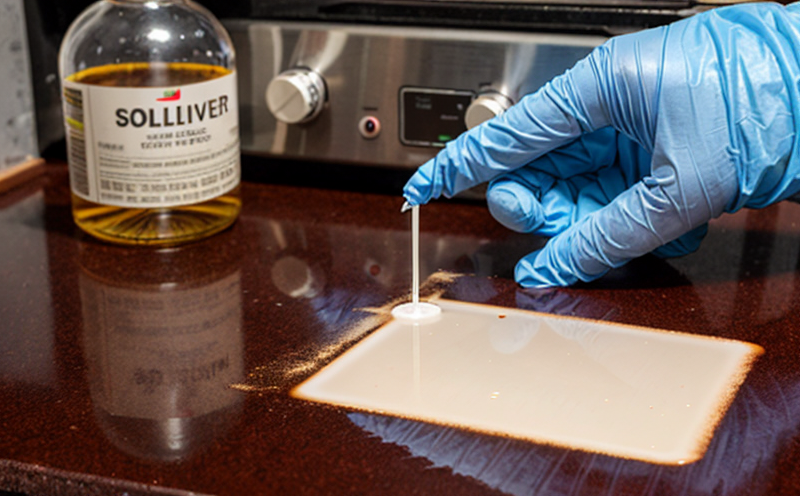ISO 14402 Solvent Residue Testing in Food Contact Materials
In today’s highly regulated food industry, ensuring that food contact materials (FCMs) are free from harmful residues is of paramount importance. The ISO 14402-3 standard provides a robust framework for evaluating the solvent residue content in FCMs to guarantee safety and compliance with global regulations. This service ensures that your products meet stringent regulatory requirements, thereby protecting consumer health and trust.
The ISO 14402 series of standards is designed to provide guidelines for environmental labeling and claims, focusing on product categories like solvents, chemicals, and other materials used in food contact scenarios. Specifically, ISO 14402-3 addresses the determination of solvent residues in FCMs through rigorous testing procedures. This service is critical for companies involved in manufacturing packaging or any material that may come into direct or indirect contact with food.
The process involves meticulous sample preparation, followed by extraction techniques to remove potential solvent residues. Modern analytical instruments such as gas chromatography-mass spectrometry (GC-MS) are employed to identify and quantify the presence of solvents in parts per million (ppm). This level of precision is essential for manufacturers aiming to comply with stringent regulatory standards like those set by the European Union’s Regulation (EU) No 10/2011 on FCMs.
The testing procedure adheres strictly to international norms, ensuring consistency and reliability. Compliance with ISO standards not only enhances product safety but also strengthens brand reputation, fostering long-term customer loyalty. By leveraging this service, manufacturers can demonstrate their commitment to quality and sustainability, thereby gaining a competitive edge in the global market.
Real-World Application
Consider a scenario where a beverage manufacturer is developing a new glass bottle design for its carbonated drinks. The company wants to ensure that any residual solvents from the manufacturing process do not compromise product safety or consumer health. By engaging our ISO 14402-3 testing service, they can confidently monitor and manage solvent residues throughout the production lifecycle.
Another example involves a packaging firm that specializes in plastic FCMs for frozen food products. They must ensure their materials meet strict national standards like those enforced by the U.S. Food and Drug Administration (FDA). Our testing service ensures these firms stay ahead of regulatory changes, maintaining compliance and enhancing product safety.
For R&D teams focusing on innovative packaging solutions, this service offers valuable insights into material performance under various environmental conditions. By identifying potential solvent residues early in the development process, they can refine their formulations to meet stringent quality benchmarks.
Customer Impact and Satisfaction
The ISO 14402-3 testing service significantly impacts customer satisfaction by ensuring that food contact materials are safe for use. Compliance with international standards like ISO 14402-3 builds trust between manufacturers and their customers, leading to increased brand loyalty. This service helps businesses meet regulatory requirements, thereby avoiding costly penalties and legal issues.
Customers who choose products from compliant suppliers can be assured of superior quality and safety. For instance, a hospital might prefer packaging materials that have undergone rigorous testing for solvent residues, ensuring patient safety above all else. Similarly, consumers purchasing food items wrapped in compliant packaging are reassured about the integrity of their purchases.
By maintaining strict adherence to ISO standards, manufacturers can also enhance their reputation as industry leaders committed to sustainability and quality. This commitment not only attracts new customers but also strengthens existing relationships with long-term partners.
Environmental and Sustainability Contributions
- Reduction in Hazardous Waste: By identifying and eliminating solvent residues, this service helps minimize the environmental impact of manufacturing processes. This contributes to a cleaner production environment, reducing waste that could potentially harm ecosystems.
- Sustainable Product Lifecycle: Ensuring FCMs are free from harmful solvents extends their lifecycle, promoting sustainable practices throughout the supply chain.
- Eco-Friendly Packaging Solutions: Compliance with ISO standards encourages the development of eco-friendly packaging that is safe for both consumers and the environment.
Competitive Advantage and Market Impact
Engaging our ISO 14402-3 testing service provides manufacturers with a significant competitive edge in several ways:
- Regulatory Compliance: Ensuring compliance with international standards enhances market access, particularly in regions with stringent regulations.
- Premier Quality Assurance: Demonstrating commitment to quality through rigorous testing can differentiate your products from competitors, attracting discerning customers and industry leaders.
- Enhanced Reputation: A reputation for product safety and compliance fosters trust within the market, leading to increased sales and customer loyalty.
This service is particularly beneficial in sectors like healthcare, where patient safety is paramount. Hospitals and pharmaceutical companies can leverage this service to ensure their packaging materials are safe and compliant with stringent regulations.





